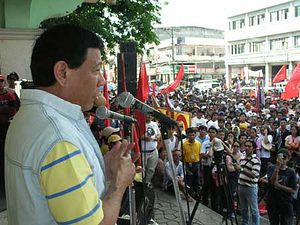The Philippine House of Representatives passed a concurrent resolution that would transform Congress into a Constituent Assembly and empower it to amend the 1987 Constitution. While proponents of charter change (known as “cha-cha” in the Philippines) have hailed it as a positive step in achieving President Rodrigo Duterte’s plan to turn the Philippines into a federal state, critics have warned it could lead to authoritarianism or even dictatorship, sparking fears dating back to the rule of strongman Ferdinand Marcos.
House Speaker Pantaleon Alvarez, one of the authors of the resolution, said it is time to review the 29-year old Constitution “to make it more attuned and responsive to the demands of present conditions and economic realities.”
He pointed out that the present system of government has created an imbalance in the distribution of wealth in favor of the capital Manila while provinces languished in deeper poverty. He argued that federalism can “spur economic regional development in the countryside, and provide impetus to much-needed socio-economic and political reforms.”
What the House Speaker failed to mention was that while the drive for federalism has gained momentum since 2016, the proposed economic and political reforms have polarized public opinion.
To take just one example, the plan to remove the constitutional restrictions on foreign ownership and control of lands, enterprises, and even vital industries have all continued to draw mixed reactions.
Duterte’s economic advisers insist that such a measure is needed to stimulate foreign investments in order to generate jobs. But it is also being disputed by some nationalists who wanted the restrictions to remain in order to protect local businesses and promote national industrialization. These voices have argued that the country can attract more foreign investments not by abolishing protectionist measures but by lowering electricity prices, eradicating corruption, and improving infrastructure.
Meanwhile, the proposed political reforms are even more controversial. Opponents of federalism think it can entrench the rule of dynasties and warlords. If the House constitutional reform bill is approved, the term limits of elected politicians will be removed. Furthermore, incumbent politicians will remain in office during the transition period towards the full implementation of federalism. This could mean the possible cancellation of the 2019 elections and the extension of Duterte’s term which ends in 2022, which would only entrench existing concerns that he plans on consolidating authoritarian control in a country that still continues to heal from the wounds of the dictatorship of Ferdinand Marcos. Duterte will also be eligible to run either as president or prime minister.
Viewed from this perspective, the charter change bill functions less as a development tool than an insidious attempt to perpetuate the power of the ruling party.
While Duterte claims that he only thinks of the people’s interest in advocating the shift to federalism, his government is accused of trying to monopolize political power by attacking the independence of the judiciary and Congress. The charter change bill espoused by his loyal supporters in the House confirmed suspicions about Duterte’s plan to remain in power beyond 2022. This has worried many groups which wanted to make the Duterte government accountable for the widespread human rights abuses allegedly committed by state forces.
Amending the constitution is a difficult undertaking, since it requires the support of both houses of Congress and the approval of the people through a national referendum. Previous governments have been attempting to do this since 1997, but they all failed after encountering massive public opposition.
Nevertheless, House Speaker Alvarez is confident that the charter change bill enjoys public backing, citing Dutere’s overwhelming electoral victory in 2016. Duterte ran on a platform of implementing a federal system of government. Also important for supporters of the move is the reported high public rating of the president, which can be used by his supporters to fast-track the campaign for charter change and reinforce the point that he is a democratically elected leader who remains popular rather than a dictator that is out of touch with his people.
However, critics contend that Duterte’s methods have included the use of strong-arm tactics which they believe is intended to instill fear among the public like the brutal “war on drugs” (known locally as Tokhang) and the extended declaration of Martial Law in the whole island of Mindanao. Duterte has also consistently ranted against groups and forces which can influence public opinion and organize a broad challenge against the charter change plan such as the church, media, civil society, the Left, and prominent members of the political opposition allied with the previous government.
The ruling party wanted to finish the charter change deliberation this year and hold a plebiscite for the ratification of the new constitution. The next few months are therefore crucial for both the proponents and opponents of charter change to mobilize public support for their cause.
If Congress is able to convert itself into a Constituent Assembly, its members should reflect on these questions posed by Senator Richard Gordon: “Are we empowering ourselves or are we empowering the people? Are we enabling ourselves or are we enabling the people?”

































